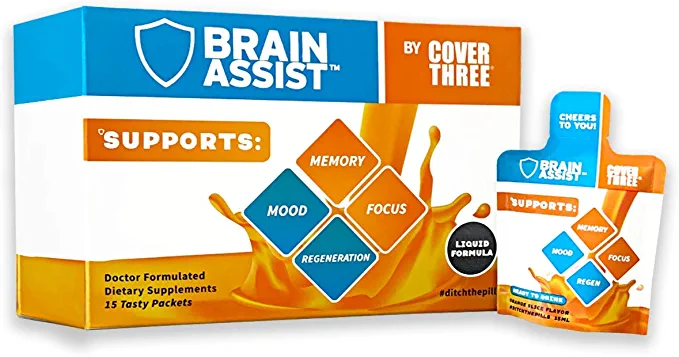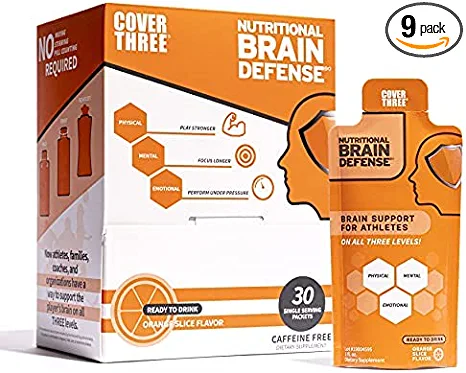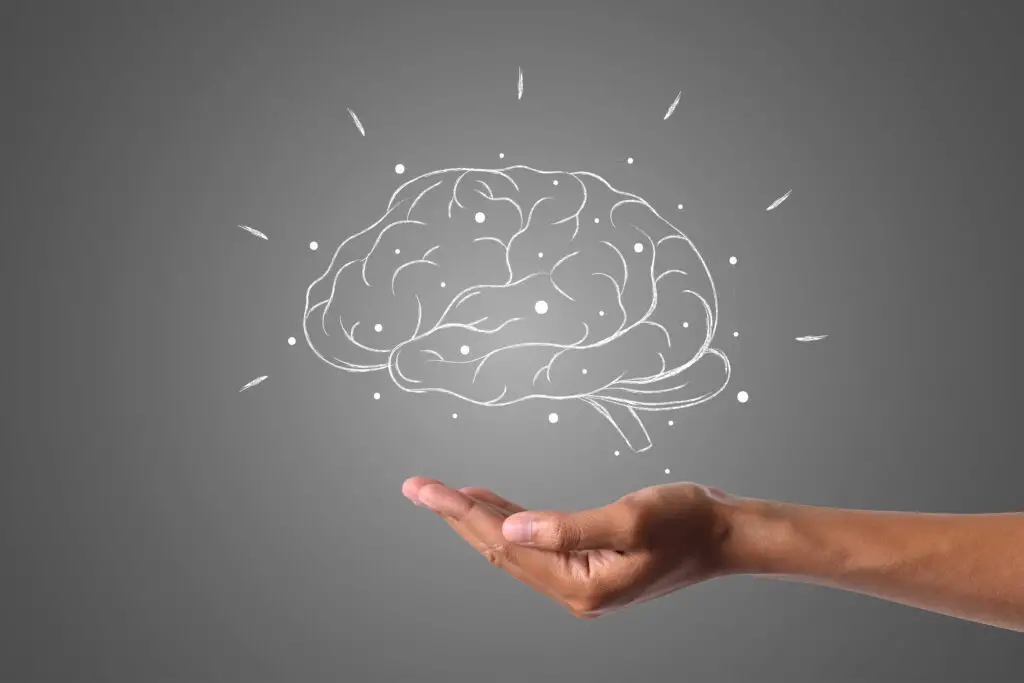Do you find yourself forgetting things, losing concentration, or having trouble processing the information you’re faced with on a daily basis? Your boss emails you, you have a million unanswered emails or texts, your kids are asking you questions; meanwhile you have to think of solutions to solve multiple problems or issues you encounter daily. You need your brain to work better, whether it’s for your success in the workplace, or your family. You need to be ‘on’ quite often but are feeling ‘off’ more often than you’d like or can afford to.
Forgetfulness, or slower reasoning and problem-solving could be signs of subtle cognitive decline that naturally occurs with time. Our cognitive functions are fully formed by the age of 25 and peak around the age of 30, but they gradually decline over the decades to come. The rate and severity of decline will depend on many factors – in a nutshell: your lifestyle and your genes. It’s known that stress, alcohol and tobacco damage your brain health. Other risk factors include brain injury, exposure to pesticides or toxins and other pollutants, or a sedentary lifestyle where you aren’t getting enough exercise.
Some of these things we can control, and others are harder – such as our stress levels. You can’t always control what happens to you in life, but you can control how you respond to it, and how you take care of yourself to have the best defense against whatever life throws your way.

New Year, New You
Your brain thrives on regular exercise, plenty of sleep, a healthy diet and mental activity, such as puzzles and problem-solving. There are certain supplements that nourish your brain, boosting its ability to absorb new information and retain that information quickly when you need it.
Cover Three’s Brain Defense and Brain Assist supplements contain curcumin, trans-resveratrol, omega-3 fatty acids (EPA and DHA), uridine, and Vitamin C to help fortify your brain so it can perform optimally. They’re free of dairy, nuts, soy, gluten, caffeine, and GMOs and produced in an FDA-approved facility. Both products are delicious orange-tasting and come packaged conveniently in to-go packets to suit a busy person’s lifestyle. No mixing or stirring is required – simply open up the top and drink! They will keep you energized for the day and especially during the toughest parts of the day when you need your mind to be working optimally.
Ongoing consumption of these products will allow you to be able to absorb and retrieve new information quicker, and dramatically reduce brain fog. Best of all – with your brain performing at its peak, think of the things you’ll be able to accomplish in the New Year and beyond. You’ll be able to learn things faster and show up better for your colleagues, family and friends with a nourished brain performing at its best. Continued brain care will ensure that your brain is healthy and free of memory problems for years to come.
Why you should trust Cover Three with your brain and overall health
Cover Three was founded by two brothers; a naturopathic doctor, (“Dr. Cover Three”) that specializes in anti-aging and regenerative medicine and his brother, a car crash survivor. Both brothers played varsity football at Brown University and know first-hand the trauma that comes with accidents, as well as repeated head injuries from contact and extreme sports. To improve the brain health of his younger brother who suffered a car crash, Dr. Cover Three created the Cover Three formula. Its success in his brother planted the idea to turn it into a small business. The initial goal was to protect athletes from a long-term cognitive decline caused by head injuries from participating in sports. Nowadays, Cover Three formulas support people from many walks of life – academics, working professionals, veterans, athletes, the elderly, parents and children.
Wondering which formula is best for you?
Here’s a breakdown of both Brain Assist and Brain Defense – who they’re best suited to and the symptoms they support:
Brain Assist
*Working professionals and parents (who need to be ‘on’ quite often)
*High school & college students (preparing for midterm and final exams)
*High performers (business executives that don’t want to lose a step)
*Support against pandemic events (mental support & immune function)

How it helps:
- The combination of omega3 and curcumin is synergistic (7) as it lowers inflammation and calms the nervous system, thus improving mood and function. (8)
- The American population is chronically deficient in Omega3s as a result of the Standard American Diet (SAD) (9) thus leaving it susceptible to mild brain trauma, concussion, and downstream neurodegeneration (10). Omega3 supplementation is a must for the “warfighter”. (11)
- Alpha-GPC fuels the production of the neurotransmitter acetylcholine for enhanced memory and focus. (12)
- Trans-resveratrol is supportive of blood flow and vascular health to help support brain function, cognition, and mood. (13). As a polyphenol, it also has special properties pertaining to how it combats the effects of aging.
- New research shows that anti-oxidant treatment with resveratrol might be able to ensure extended use of brain-computer interfaces beyond what is currently possible. (14) Neuroprotective resveratrol can protect your veterans from neurodegeneration (resulting from TBI, alcohol, toxicity, and stress) and the negative mental and emotional effects that go along with it.
- Curcuminoids (via turmeric) boost Brain-Derived Neurotrophic Factor (BDNF), which enhances neuroplasticity and is critical in new learning. This flexibility will be helpful during a veteran’s transition to civilian life. They also boost DHA in the brain (2), playing a synergistic role in brain development and protection from cognitive disease.
- Research over the last three decades shows that Curcuminoids can treat depression by boosting BDNF. For example, in the 1990’s the “neurotrophic” hypothesis of depression, associated chronic stress, and depression with a deficit in BDNF and demonstrated that traditional antidepressants increased BDNF expression (3). By the early 2000s, studies showed evidence of cellular atrophy and neuronal death in major depressive disorder (MDD). Studies also showed increased BDNF levels associated with antidepressant therapies such as physical exercise (4), antidepressants (5), or electroconvulsive therapy (6). This supports the hypothesis that the neurotrophic effects of antidepressants account for their efficacy in treating MDD, with some viewing BDNF as an essential determinant of antidepressant efficacy (5).
Brain Defense
Brain Defense is best suited to:
*Athletes (Memory, Focus, Strength, and Recovery)
*Survivors (Car wrecks, Traumatic Brain Injuries (TBIs), careers in combat sports, horse falls/kicks)
*Veterans (Defense from combat history and to support the return to civilian life)
Example: Operator’s syndrome. The Warrior Health Foundation describes this as damage to the body and pituitary gland and is a result of exposure to concussive blast waves.

The Brain Defense formula can support the brain to help the individual deal with the following issues:
- challenges of the transition from military to civilian life
- memory, concentration, and cognitive impairments
- depression
- suicide (i.e. suicidal thoughts and tendencies)
- substance abuse
- traumatic brain injury effects
- endocrine dysfunction
- sleep disturbance
- obstructive sleep apnea
- chronic joint/back pain
- orthopedic problems
- headaches
- anger; worry, rumination, and stress reactivity
- marital, family, and community dysfunction
- common existential issues
- vestibular and vision impairments
Brain Defense fights brain inflammation, which can be caused by a variety of things such as chronic stress, autoimmune responses, nutritional deficiencies, insect bites, infections, environmental toxicity from water and air pollution, traumatic events like TBIs, and stress. (16) Because inflammation of the brain can alter the conversion of hormones and neurotransmitters, it can directly contribute to mood disorders. A surprising example of this is when inflammatory cytokines disrupt the normal conversion of tryptophan into serotonin by instead converting it into kynurenine, which is neurotoxic and quinolinic acid which is pro-depressive. (17) This exemplifies how a veteran’s system can be hijacked and sent into a suicidal spiral. Instead of getting a feel-good hormone boost from the serotonin, there is instead a depressive drag on their system. Unhealthy inflammation plays a role in all chronic diseases including but not limited to cognitive decline, Alzheimer’s, heart disease and stroke, cancer, osteoarthritis and the causation of some forms of mental illness including depression. (15)
It’s a ‘no-brainer!’
Whether you’re a student, professional, or recovering from injuries, Cover Three’s Brain Assist and Brain Defense contain the most nutrient-dense supplements to nourish your brain with the vitamins and minerals is craving to do its job most efficiently and help you live your best life.

Best suited for busy men and women of all ages, both formulas have a natural great-tasting flavor that can you can enjoy on a daily basis, as a replacement for the coffee or energy drinks you use to stay ‘awake.’ Support your brain using natural food-derived, high-quality minerals that your brain will love. As both Brain Assist and Brain Defense are free from added sugar, caffeine, and GMOs – you can’t go wrong giving them a try. Start replenishing memory loss with the nutrients your brain deserves. Give your brain its best shot to help you navigate life more efficiently in the New Year.
References:
2. Wu A, Noble EE, Tyagi E, Ying Z, Zhuang Y, Pinilla FG. Curcumin boosts DHA in the brain: implications for the prevention of anxiety disorders. Biochim Biophys Acta. (2015) May; 1852(5): 951–961. doi:10.1016/j.bbadis.2014.12.005.
3. Lee BH, Kim YK. The Roles of BDNF in the pathophysiology of major depression and in antidepressant treatment. Psychiatry Investig. (2010) 7:231–5. doi: 10.4306/pi.2010.7.4.231
4. Zoladz JA, Pilc A. The effect of physical activity on the brain-derived neurotrophic factor: from animal to human studies. J Physiol Pharmacol. (2010) 61:533–41.
5. Björkholm C, Monteggia LM. BDNF – a key transducer of antidepressant effects. Neuropharmacology. (2016) 102:72– 9. doi: 10.1016/j.neuropharm.2015.10.034
6. Rocha RB, Dondossola ER, Grande AJ, Colonetti T, Ceretta LB, Passos IC, et al. Increased BDNF levels after electroconvulsive therapy in patients with major depressive disorder: a meta-analysis study. J Psychiatr Res. (2016) 83:47–53. doi: 10.1016/j.jpsychires.2016.08.004
7. Lay CL, Huang SY, Kong AN. Synergistic anti-inflammatory effects of low doses of curcumin in combination with polyunsaturated fatty acids- Docosahexaenoic acid or eicosapentaenoic acid. Biochemical Pharmacology. (2010) 79: 421–430
8. Lee CH, Giuliani F. The Role of Inflammation in Depression and Fatigue. Front Immunol. 2019 Jul 19;10:1696. doi: 10.3389/fimmu.2019.01696. PMID: 31379879; PMCID: PMC6658985.
9. Papanikolaou Y, Brooks J, Reider C, and Fulgoni V. U.S. adults are not meeting recommended levels for fish and omega-3 fatty acid intake- results of an analysis using observational data from NHANES 2003–2008. (2014) Nutrition Journal. 13:31
10. Morley WA, Seneff S. Diminished brain resilience syndrome: A modern day neurological pathology of increased susceptibility to mild brain trauma, concussion, and downstream neurodegeneration. Surg Neurol Int 2014;5:97.
11. Coulter ID. The Response of an Expert Panel to Nutritional Armor for the Warfighter- Can Omega-3 Fatty Acids Enhance Stress Resilience, Wellness, and Military Performance? (2014) Military Medicine. 179: 11-192.
12. Parker AG, Byars A, Purpura M, Jäger R. The effects of alpha-glycerylphosphorylcholine, caffeine or placebo on markers of mood, cognitive function, power, speed, and agility. J Int Soc Sports Nutr. 2015 Sep 21;12(Suppl 1):P41. doi: 10.1186/1550-2783-12-S1-P41. PMCID: PMC4595381.
13. Evans HM, Howe PRC, and Wong RHX. Clinical Evaluation of Effects of Chronic Resveratrol Supplementation on Cerebrovascular Function, Cognition, Mood, Physical Function and General Well-Being in Postmenopausal Women—Rationale and Study Design. (2016) Nutrients. 8, 150; doi:10.3390/nu8030150
14. Capadona JR. Effects of Anti-oxidants on Performance of Brain-computer Interfaces. U.S. Department of Veterans Affairs. (2022) APT Center. Neural Interfaces.
15. Lee CH, Giuliani F. The Role of Inflammation in Depression and Fatigue. Front Immunol. 2019;10:1696. Published 2019 Jul 19. doi:10.3389/fimmu.2019.01696
16. Schmidt C. “Inflammation and Brain Health” Harvard Medicine, https://hms.harvard.edu/magazine/aging/inflammation-brain-health. October 2021.
17. Sorgdrager FJH, Naudé PJW, Kema IP, Nollen EA, Deyn PP. Tryptophan Metabolism in Inflammaging: From Biomarker to Therapeutic Target. Front Immunol. 2019 Oct 30;10:2565. doi: 10.3389/fimmu.2019.02565. PMID: 31736978; PMCID: PMC6833926.




